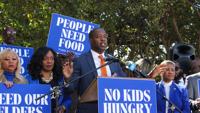Alabama Democrats Monday said that Gov. Kay Ivey Monday should call a special session of the Alabama Legislature to help feed more than 726,000 Alabamians who lost food assistance Saturday.
“We’re here. We’re ready to work. We’re ready to make sure that not one Alabamian, not one senior citizen, not one child, not one disabled person in the state of Alabama goes hungry,” Sen. Merika Coleman, D-Birmingham, said at the press conference. “We challenge our Republican colleagues to come out as well, because it’s not just the constituents in our district, it is all Alabamians.”
Gina Maiola, communications director for Ivey, said in an email Monday evening that Ivey does not intend to call a special session.
Messages seeking comment from House Speaker Nathaniel Ledbetter, R-Rainsville and Senate Pro Tem Garlan Gudger, R-Cullman, were left Monday afternoon.
The call comes one week after the U.S. Department of Agriculture (USDA) announced benefits for the Supplemental Nutrition Assistance Program (SNAP) were suspended for November. According to the Alabama Department of Human Resources, more than 726,000 Alabamians receive SNAP benefits, which is about 15% of the state population. Of that number, 330,000 (44%) are children, according to DHR.
A federal court on Saturday ordered the Trump administration to resume payments to SNAP beneficiaries by Wednesday. The Trump administration told a federal court Monday that it would use a contingency fund — which it had previously refused to employ — to pay about half the benefits for the month, though an official said that could take months.
According to Alabama SNAP Director Brandon Hardin, one month of SNAP benefits costs about $142 million.
Democratic lawmakers want Ivey to call a special session to allocate funds from the state’s emergency fund and excess funds from state agencies for SNAP. A message seeking comment from the Legislative Services Agency’s Fiscal Division was left Monday afternoon.
“Many of those households are people that are working in a large percentage of the working poor,” said House Minority Leader Anthony Daniels, D-Huntsville. We’re talking about children being impacted.”
DHR encouraged SNAP recipients to go to local food banks and pantries, but those organizations are overwhelmed as it is. For every one meal that a food bank provides, SNAP provides nine, according to Feeding Alabama.
Jannah Bailey, CEO of the River Region United Way, said Monday that food banks and nonprofits like United Way are collecting as much food as possible.
“Dear God, break their hearts. Let them hear us today. Have a special session. Release some of this money,” Bailey said. “We are collecting food as best we can.”
Senate Minority Leader Bobby Singleton, D-Greensboro, said Ivey’s office told him that it would not use state funds because they are unsure if the federal government would reimburse the state.
“We’ve seen other states around us, like Louisiana, Virginia, and those states that are filing the lawsuits. They are doing something within their states, whether it’s full program funding or some partial program funding, they are doing something,” Singleton said. “And we are asking this governor to act on behalf of the people of the state of Alabama. She is the governor, and she’ll be looking out for her own party, and not just waiting on the federal government to act.”
Last week, U.S. Senator and candidate for Alabama Governor Tommy Tuberville said most SNAP recipients are constituents of Democrats in inner cities. There is a higher percentage of SNAP recipients than the state average in Democratic-leaning counties like Dallas (29.6%) and Wilcox (32.2%), which are some of the highest poverty ridden counties in the state, according to September data emailed by DHR last week. However, Republican-leaning counties like Barbour (19.5%), Houston (16.5%) and Fayette (16.7%) also have more SNAP recipients than the state average.
“You can’t pretend to represent the people of Alabama and pick and choose based upon who you think is in your political party,” Rep. Chris England, D-Tuscaloosa, said. “This is common sense. If these folks can’t eat, if these folks can’t survive, it is not an individual issue. It is a community issue.”
The suspension of benefits came about a month into the federal government shutdown, which is a dispute over health care. Republicans in Congress lack the votes to overcome a budget filibuster. Democrats say they want a bipartisan agreement to extend looming cuts in subsidies for Affordable Care Act plans. Republicans said they won’t negotiate that until a stopgap spending bill is passed.
Under the One Big Beautiful Bill Act (OBBBA), the federal government would cut its share of funding for SNAP in fiscal year 2027, increasing the state’s share. According to estimates in August, the federal cuts to the program would increase DHR’s budget request by $35 million in FY27 and $208 million in FY28 when the state is responsible for 10% of SNAP benefits.
This story was updated at 5:55 p.m. to include Gov. Ivey’s plan to not call a special session.
This story is from alabamareflector.com.
















(0) comments
Welcome to the discussion.
Log In
Keep it Clean. Please avoid obscene, vulgar, lewd, racist or sexually-oriented language.
PLEASE TURN OFF YOUR CAPS LOCK.
Don't Threaten. Threats of harming another person will not be tolerated.
Be Truthful. Don't knowingly lie about anyone or anything.
Be Nice. No racism, sexism or any sort of -ism that is degrading to another person.
Be Proactive. Use the 'Report' link on each comment to let us know of abusive posts.
Share with Us. We'd love to hear eyewitness accounts, the history behind an article.